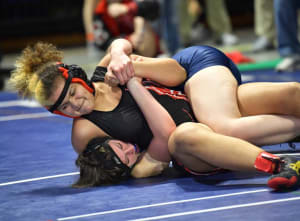
In the traditionally male-dominated world of sports, women's participation in wrestling has long been met with skepticism and resistance. However, in recent years, there has been a significant shift as more girls across the globe are stepping onto the mats and making their mark in the sport. High school wrestling, once considered exclusively a boys' domain, is now experiencing a surge in female participation, breaking barriers and reshaping perceptions. In this article, we explore the growing phenomenon of women's high school wrestling, highlighting its impact on athletes, schools, and the broader wrestling community.
Historically, opportunities for female wrestlers at the high school level were limited, with many girls having to compete on boys' teams or forego the sport altogether. However, thanks to advocacy efforts, increased awareness, and the establishment of girls' wrestling programs, more girls now have the opportunity to compete against their peers in a supportive and inclusive environment.
In recent years, the number of states sanctioning girls' wrestling as an official high school sport has grown significantly, providing girls with the opportunity to compete for individual and team championships. Additionally, the creation of girls' wrestling clubs and leagues has further expanded access to the sport, allowing girls to develop their skills and compete at local, regional, and national levels.
Participating in high school wrestling offers a multitude of benefits for female athletes, both on and off the mat. Physically, wrestling is a demanding sport that builds strength, endurance, agility, and flexibility—qualities that are essential for success in any athletic endeavor. Through rigorous training and competition, female wrestlers develop discipline, resilience, and mental toughness, skills that serve them well in all aspects of life.
Moreover, women's high school wrestling provides a platform for girls to challenge stereotypes, defy expectations, and assert their presence in traditionally male-dominated spaces. By competing alongside their male counterparts, female wrestlers break down barriers and pave the way for future generations of athletes. Their achievements not only inspire other girls to pursue their athletic dreams but also challenge societal norms and promote gender equality in sports.
The inclusion of women's wrestling in high school athletics has a positive impact not only on individual athletes but also on schools and communities as a whole. By offering girls' wrestling programs, schools demonstrate their commitment to diversity, inclusion, and gender equity in sports. Female wrestlers become role models and ambassadors for their schools, inspiring pride and unity among students, faculty, and supporters.
Furthermore, women's high school wrestling fosters a sense of camaraderie and belonging among athletes, coaches, and fans. Wrestling tournaments and matches provide opportunities for communities to come together, celebrate their athletes' achievements, and showcase the talent and dedication of female wrestlers. As the popularity of women's high school wrestling continues to grow, so too does its impact on the broader wrestling community, creating a more inclusive and diverse sport for all.

